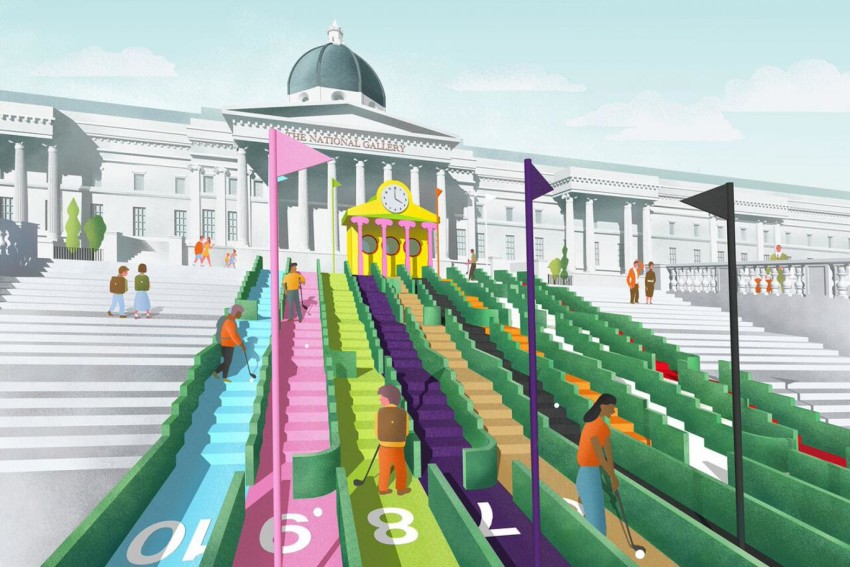A pop-up crazy golf course for London’s Trafalgar Square has been proposed by a group of artists and designers. Curated by Paul Smith, the project is part of this year’s London Design Festival. Each hole offers a unique take on the theme of “Cities of the future” and will feature designs from the late Zaha Hadid, Paul Smith, Mark Wallinger, and London-based practice Ordinary Architecture.
Permission from the Mayor’s office to use Trafalgar Square has already been secured, however, the project is currently in the process of gathering funds ($175,000 is the target figure) via its Kickstarter page. If achieved, the golf course will stay in London from 16-22 September, coinciding with the Festival itself while being “futuristic, functional, fun and free for the public to play.”
The golf course will reside on the steps from the National Gallery overlaying them with colored stripes, topped by a neo-classical clubhouse that reflects the museum, while also having a turf roof and putters for columns.
Prizes and gifts for those who fund the project are also on offer. For $100 you can receive a limited edition scarf designed by Paul Smith, while for $36, you can the chance to name the giant “pigeonhole” designed by Charles Holland and Elly Ward of Ordinary Architecture as well as a mug with the pigeon on it.
Speaking of naming the pigeon, Holland told AN that he would name it “Pigeon McPigeonface” if given the chance. His and Ward’s oversized pecking pigeon will swallow the golf ball (if putters can successfully time their shots) and eject it out over the hole after it travels through the pigeon’s digestive system.
According to Holland, designers were given free reign when creating their crazy golf hole and said that inspiration for his design came from the “giant anthropomorphic structures often seen at world fairs.”
“We looked at giant figurative pop objects, symbolism and the idea of creating retrospective symbols,” he said.
“We wanted to create a fantastic creature/sculpture, something that was contextual to the square. When you think of pigeons, you think of Trafalgar Square and them being gritty, urban vermin…. So I think the fact that ours has got one leg is pretty appropriate!”
“It’s educational and scatological,” continued Holland. “I always quite like scatological art… I enjoy [its] crudeness. It could also be seen as an egg, from a distance it’s quite ambiguous.”
As for the scale, Holland said the pigeon was befitting to the “realm of crazy golf” that contains “surreal versions of things, an undersized windmill for example.”
Festival director Ben Evans said: “If you do a project in Trafalgar Square it’s quite a challenging public space and you need to find something that engages a wide group of people because there are a million people passing by each week. We want them to stop and say ‘Wow, what’s that?’
Speaking of Hadid’s design, Evans added “It will be poignant because of Zaha’s death but I think what she’s done is stunning.”
“She’s done a number of things for the festival over the years and the company are keen to ensure all of the projects that were in development go ahead. For us, this is an opportunity to celebrate and honor her.”
The project meanwhile states that: “It is one of the few opportunities to use this prime location for cultural activity, and we are confident that there will be enough people who share Paul Smith and the London Design Festival’s enthusiasm to enable its success.”
